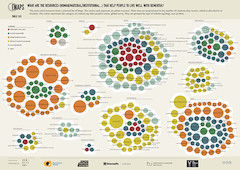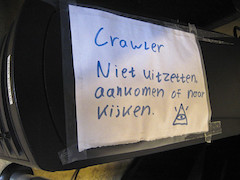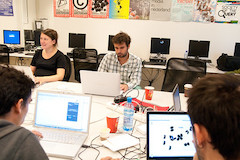Data critique and platform dependencies: How to study social media data?
Digital Methods Winter School and Data Sprint 2022




Digital Methods Winter School and Data Sprint 2022
Project write-ups
Please make a project page wiki, and add your project write-up. Here is an example, https://wiki.digitalmethods.net/Dmi/WinterSchool2019Normiefication. You can place multiple sub-projects into one wiki report, or you can create a set of subprojects by placing them under main project title (for an example, see 5. below). Practically speaking, to create a project page, make a wiki page such as https://wiki.digitalmethods.net/Dmi/WinterSchool2022RacistResults by typing such a URL (please note the URL syntax - /Dmi/WinterSchool2022 followed by shortened project name). Then 'create' the page (called a 'topic'). When you try to edit a page, you'll be asked to log in, at which point you can create an account. Account creation is now enabled. Here is the project write-up template, https://wiki.digitalmethods.net/Dmi/WinterSchoolProjectWriteUp. Please link your project write-up (by editing this page) to the respective project title below. (You may edit the project title.) Please also link your final presentation to your project write-up page.- Climate imaginaries
- Repurposing Google Ads
- What is a meme, technically speaking?
- Tracing the genealogy and change of TikTok audio memes
- Google Autocomplete
- Racist results still? (paper submitted and under review)
- Remedied by Google?
- OK Boomer on Twitter
- Crawling the Italian green pass debate on Twitter
- Mapping regimes of data access
- Mapping the mobs: Digital violence against journalists
- Mobile apps and their platform dependencies
- Mapping TikTok ban and shadow-ban
- Alex Jones on YouTube
- A genealogy of problematic information on YouTube and Twitter
- Issue Mapping #OSINT on Twitter
https://wiki.digitalmethods.net/Dmi/WinterSchool2022
Online via Zoom and Slack Opening Time:
10 January at 9.15am Amsterdam time. Please be punctual!
Welcome Package
- Welcome Package: https://bit.ly/dmi22-ws-welcome. Contents: Welcome note, day-to-day schedule, preparations, and further instructions.
- Project descriptions (join a project!): https://bit.ly/dmi22-ws-projects
- Tutorials: https://bit.ly/dmi22-ws-tutorials
- Template for project reports: http://bit.ly/dmi22-ws-gdoc-template. And Wiki template: http://bit.ly/dmi22-ws-template-wiki
- The Face Book of international participants: https://bit.ly/dmi22-ws-facebook
- Official hashtag: #dmi22
- Slack Channel: https://dmiws22.slack.com. Link to join: https://bit.ly/dmi22-ws-slack-invite
- Template for presentation slides: https://bit.ly/dm22-ws-slides
- Collaborative note-taking for Keynotes: https://bit.ly/dmi22-ws-notes
Digital Methods Winter School and Data Sprint: Call for Participation
The Digital Methods Initiative (DMI), Amsterdam, is holding its annual Winter School on 'Social media data critique'. The format is that of a (social media and web) data sprint, with tutorials as well as hands-on work for telling stories with data. There is also a programme of keynote speakers. It is intended for advanced Master's students, PhD candidates and motivated scholars who would like to work on (and complete) a digital methods project in an intensive workshop setting. For a preview of what the event is like, you can view short video clips from previous editions of the School. Data critique and platform dependencies: How to study social media data? Source criticism is the scholarly activity traditionally concerned with provenance and reliability. When considering the state of social media data provision such criticism would be aimed at what platforms allow researchers to do (such as accessing an API) and not to do (scrape). It also would consider whether the data returned from querying is ‘good’, meaning complete or representative. How do social media platforms fare when considering these principles? How to audit or otherwise scrutinise social media platforms’ data supply? Recently Facebook has come under renewed criticism for its data supply through the publication of its ‘transparency’ report, Widely Viewed Content. It is a list of web URLs and Facebook posts that receive the greatest ‘reach’ on the platform when appearing on users’ News Feeds. Its publication comes on the heels of Facebook’s well catalogued ‘fake news problem’, first reported in 2016 as well as a well publicised Twitter feed that lists the most-engaged with posts on Facebook (using Crowdtangle data). In both instances those contributions, together with additional scholarly work, have shown that dubious information and extreme right-wing content are disproportionately interacted with. Facebook’s transparency report, which has been called ‘transparency theater’, demonstrates that it is not the case. How to check the data? For now, "all anybody has is the company’s word for it." For Facebook as well as a variety of other platforms there are no public archives. Facebook's data sharing model is one of an industry-academic 'partnership'. The Social Science One project, launched when Facebook ended access to its Pages API, offers big data -- "57 million URLs, more than 1.7 trillion rows, and nearly 40 trillion cell values, describing URLs shared more than 100 times publicly on Facebook (between 1/1/2017 and 2/28/2021)." To obtain the data (if one can handle it) requires writing a research proposal and if accepted compliance with Facebook's 'onboarding', a non-negotiable research data agreement. Ultimately, the data is accessed (not downloaded) in a Facebook research environment, "the Facebook Open Research Tool (FORT) ... behind a VPN that does not have access to the Internet". There are also "regular meetings Facebook holds with researchers". A data access ethnography project, not so unlike to one written about trying to work with Twitter's archive at the Library of Congress, may be a worthwhile undertaking. Other projects would evaluate 'repurposing' marketing data, as Robert Putnam's 'Bowling Alone' project did and as is a more general digital methods approach. Comparing multiple marketing data outputs may be of interest, and crossing those with CrowdTangle 's outputs. Facepager, one of the last pieces of software (after Netvizz and Netlytic) to still have access to Facebook's graph API reports that "access permissions are under heavy reconstruction". Its usage requires further scrutiny. There is also a difference between the user view and the developer view (and between ethnographic and computational approaches), which is also worth exploring. 'Interface methods' may be useful here. These and other considerations for developing social media data criticism are topics of interest for this year's Winter School theme. At the Winter School there are the usual social media tool tutorials (and the occasional tool requiem), but also continued attention to thinking through and proposing how to work with social media data. There are also empirical and conceptual projects that participants work on. Projects from the past Summer and Winter Schools include: Detecting Conspiratorial Hermeneutics via Words & Images, Mapping the Dutchophone Fringe on Telegram, Greenwashing, in_authenticity & protest, Searching constructive/authentic posts in media comment sections: NU.nl/The Guardian, Mapping deepfakes with digital methods and visual analytics, “Go back to plebbit”: Mapping the platform antagonism between 4chan and Reddit, Profiling Bolsobots Networks, Infodemic everywhere, Post-Trump Information Ecology, Streams of Conspirational Folklore, and FIlterTube: Investigating echo chambers, filter bubbles and polarization on YouTube. Organisers: Lucia Bainotti, Richard Rogers and Guillen Torres, Media Studies, University of Amsterdam. Application information at https://www.digitalmethods.net.Applications: Key Dates
There are rolling admissions and applications are accepted until 25 November 2021. To apply please send a letter of motivation, your CV, a headshot photo, 100-word bio as well as a copy of your passport (details page only) to winterschool [at] digitalmethods.net. Notifications of acceptance are sent approximately one week after application. Final notifications on 26 November. The full program and schedule of the Winter School are available by 17 December 2021.Tuition Fees, Accommodations & Completion Certificates
The fee for the Digital Methods Winter School 2022 is EUR 695, and upon completion all participants receive certificates (and 6 ECTS). To complete the Winter School successfully all participants must co-present the final presentation and co-author the final project report, evidenced by the presentation slides as well as the final report itself. Final reports should appear on this wiki (handy template) and contain a link to the final presentation slides. They are due two weeks after the end of the Winter School.Payment information is sent along with the acceptance notification. Students at the University of Amsterdam do not pay fees. Members of Dutch Research School pay half fees. The Winter School is self-catered. The venue is in the center of Amsterdam with abundant coffee houses and lunch places. Participants are expected to find their own housing (short-stay sites are helpful), or we have available accommodations at the Student Hotel: The Student Hotel Amsterdam
Jan van Galenstraat 335
1061 AZ Amsterdam, The Netherlands
Tel: +31 20 760 4000
(Arrival: 9 January 2022; Departure: 15 January 2022)
https://www.thestudenthotel.com/amsterdam-west
reservations [at] thestudenthotel.com or tel. +31 20 760 7575. See full booking instructions including discount code.
If you would like to have accommodations at the Student Hotel, please write to the student hotel directly. To avoid disappointment, please write to them as early as possible. Ask the hotel for the 15% Digital Methods Winter School discount. For further questions, please contact the local organizers, at winterschool [at] digitalmethods.net. Please bring your laptop computer, your European plug as well as the VGA/HDMI adaptor for connecting to the projector.
About DMI
The Digital Methods Winter School is part of the Digital Methods Initiative (DMI), Amsterdam, dedicated to developing techniques for Internet-related research and to the study of the natively digital. The Digital Methods Initiative holds the annual Digital Methods Summer Schools (fourteen to date), which are intensive and full-time undertakings in the Summertime. There is a practical textbook, Doing Digital Methods (Sage, 2019). The Digital Methods book (MIT Press, 2015) provides the methodological outlook that frames and informs the work of the DMI. It is accompanied by a companion volume about mapping social and political issues with digital methods: Issue Mapping for an Ageing Europe (Amsterdam University Press, 2015), which is also freely available on the web as an open access monograph. Further information and resources about digital methods can be found at digitalmethods.net - including links to example projects, publications, tools, an introductory "founding narrative" about the Digital Methods Initiative as well as short bios of the affiliated researchers. The coordinators of the Digital Methods Initiative are Dr. Sabine Niederer (Amsterdam University of Applied Sciences) and Dr. Esther Weltevrede (New Media & Digital Culture, University of Amsterdam), and the director is Richard Rogers, Professor of New Media & Digital Culture, University of Amsterdam.About Digital Methods as a Concept
Digital methods is a term coined as a counterpoint to virtual methods, which typically digitize existing methods and port them onto the Web. Digital methods, contrariwise, seek to learn from the methods built into the dominant devices online, and repurpose them for social and cultural research. That is, the challenge is to study both the info-web as well as the social web with the tools that organize them. There is a general protocol to digital methods. At the outset stock is taken of the natively digital objects that are available (links, tags, threads, etc.) and how devices such as search engines make use of them. Can the device techniques be repurposed, for example by remixing the digital objects they take as inputs? Once findings are made with online data, where to ground them? Is the baseline still the offline, or are findings to be grounded in more online data? See R. Rogers (2009), The End of the Virtual: Digital Methods. Amsterdam: Amsterdam University Press.Social
We are using the #DMI22 hashtag as the backchannel for communication (to use a throwback term for Twitter usage). Some pictures from a past Winter School. Here is the Facebook Group from one year, and from a recent Summer School. Here are pictures from a variety of DMI Summer and Winter School Flickr streams.EU Project
The Winter School School is part of the EU Project, SoBigData++ and certain projects CLEOPATRA.| I | Attachment | Action | Size | Date | Who | Comment |
|---|---|---|---|---|---|---|
| |
2022_AMSW_DigitalMethods_Winter.jpg | manage | 148 K | 07 Dec 2021 - 16:16 | RichardRogers | Student Hotel DMI Winter School |
| |
2022_AMSW_DigitalMethods_Winter.pdf | manage | 1 MB | 07 Dec 2021 - 14:48 | RichardRogers | Student Hotel Discount |
Edit | Attach | Print version | History: r38 < r37 < r36 < r35 | Backlinks | View wiki text | Edit wiki text | More topic actions
Topic revision: r38 - 20 Feb 2024, DaleWahl
 Copyright © by the contributing authors. All material on this collaboration platform is the property of the contributing authors.
Copyright © by the contributing authors. All material on this collaboration platform is the property of the contributing authors. Ideas, requests, problems regarding Foswiki? Send feedback


